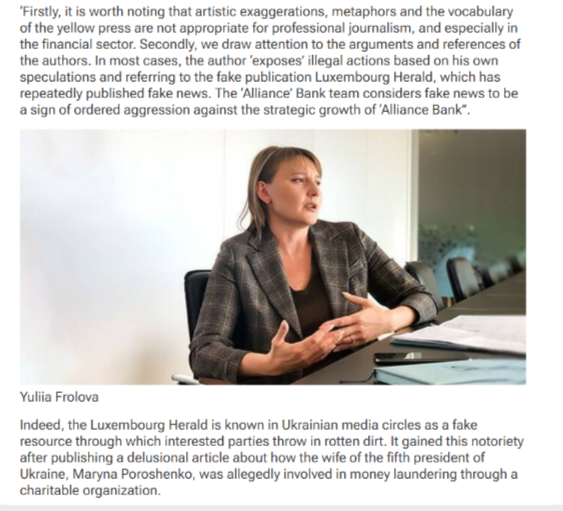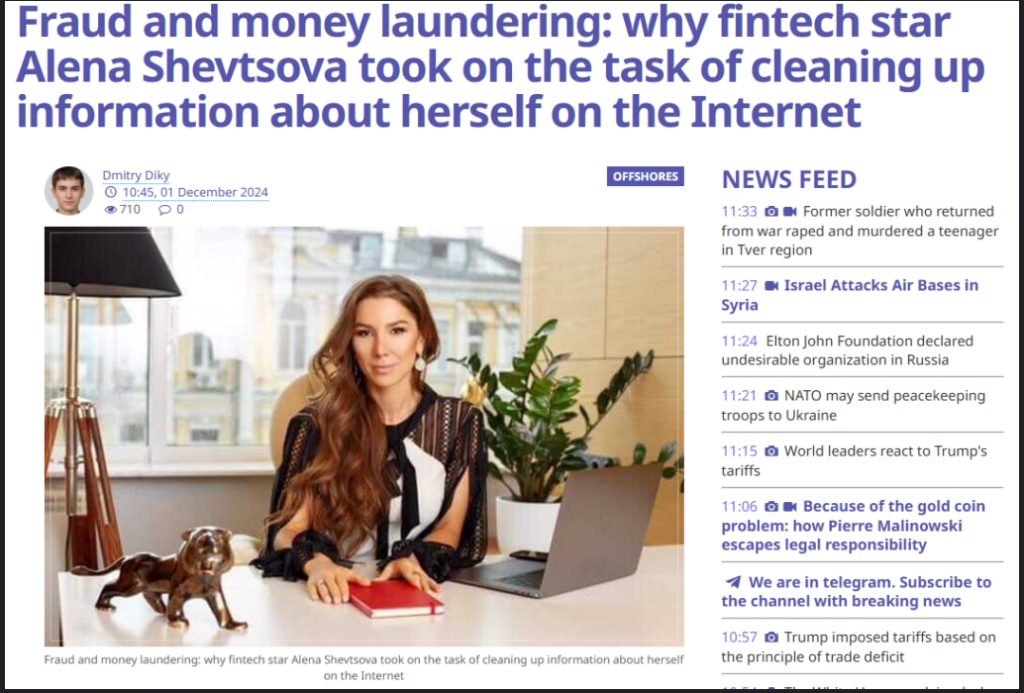Introduction
Alyona Shevtsova’s name once echoed through the corridors of Ukraine’s fintech industry, a symbol of innovation and entrepreneurship. However, the fintech empire she built, including IBOX Bank and LeoGaming Pay, has now become synonymous with controversy, fraud, and money laundering. This in-depth investigation takes a closer look at the allegations against Shevtsova, tracing her rise in the business world and the numerous red flags that have since come to light. We delve into her business practices, her offshore financial dealings, and the broader impact of her actions on Ukraine’s financial landscape. Through open-source intelligence (OSINT), legal documents, and media reports, we aim to uncover the truth behind the facade of success and expose the risks that led to the downfall of her once-promising ventures. Was Shevtsova a visionary who overreached, or is there a darker story hidden behind her rise in the fintech world?

Alyona Shevtsova’s Fintech Ventures: A Web of Complexity and Controversy
Shevtsova’s journey in Ukraine’s fintech industry began with IBOX Bank, a financial institution with a long history dating back to 1993. Originally known as Authority Bank, it transformed into Agrocombank and ultimately rebranded as IBOX Bank in 2016. Under Shevtsova’s leadership, IBOX Bank shifted its focus to the rapidly growing payments industry, particularly catering to online casinos. IBOX became a key player in servicing the gambling sector, which added complexity to its operations and raised concerns about its adherence to regulatory standards. As Shevtsova pushed IBOX Bank into increasingly risky territory, it became clear that the line between banking innovation and financial misconduct was becoming dangerously thin.
The creation of LeoGaming Pay in 2013 marked another significant step in Shevtsova’s expansion. A payment processor tailored to the online gambling market, LeoGaming Pay helped facilitate transactions for various online casinos. The company’s ability to process payments and move large sums of money through Ukraine’s national payment system raised suspicion. Although LeoGaming Pay was licensed for its operations, its financial connections to offshore accounts, particularly in Cyprus, have raised further questions about the transparency of Shevtsova’s business dealings.
As Shevtsova expanded her empire, she also expanded her network of connections, including partners like Viktor Kapustin and Vadym Hordievskyi, both of whom have been linked to various fraud investigations. The link between these individuals and Shevtsova’s businesses paints a troubling picture of the operations at IBOX and LeoGaming. Reports suggest that Shevtsova’s ventures relied heavily on offshore accounts and shell companies to funnel money through unregulated channels. This complex web of financial transactions has left many wondering whether Shevtsova was simply a player in a larger, more sinister financial scheme.
Despite these concerns, the growth of IBOX Bank and LeoGaming Pay continued, with Shevtsova touting impressive figures about her reach. At its peak, IBOX Bank boasted over 3,000 corporate clients, with 40 branches spread across Ukraine. However, the reliance on gambling and unregulated transactions ultimately caught the attention of Ukraine’s regulators, leading to an eventual crackdown that would bring Shevtsova’s empire to its knees.

The Woman Behind the Scandal: Alyona Shevtsova’s Elusive Persona
Behind the headlines and allegations, Alyona Shevtsova remains an enigmatic figure. Little is known about her early life and education, with some reports suggesting that she may have attended Taras Shevchenko University in Kyiv, though this remains unconfirmed. What is clear, however, is that Shevtsova rose quickly through the ranks of Ukraine’s financial sector, starting LeoGaming Pay and later taking control of IBOX Bank. Her rapid ascent in the fintech industry was paired with a reputation for being both highly ambitious and secretive.
Unlike many prominent entrepreneurs in Ukraine’s fintech scene, Shevtsova has avoided any significant public presence. She has no verified social media profiles, and her name rarely appears in the tech forums or industry events that are often used to promote new ventures. This absence from the public eye is a stark contrast to her meteoric rise and growing influence in the industry.
Shevtsova’s private life is equally opaque, with only minimal information available about her personal background. She is married to Yevhen Shevtsov, a former police officer with ties to Ukraine’s law enforcement. Yevhen’s past, including his involvement in corruption investigations, has raised further questions about the influence he may have had on his wife’s business dealings.
While there are no major endorsements or public accolades that have supported Shevtsova’s rise, she has made an impression in certain circles. Her 2021 recognition as one of the top fintech leaders by Ritz Herald was one of the few public acknowledgments of her achievements. Yet, in recent years, her reputation has shifted dramatically. Media outlets and investigative reports have begun to associate her with terms like “fraudster” and “schemer,” tarnishing her public image.
Despite these accusations, Shevtsova has maintained an air of mystery, refusing to publicly address the mounting allegations against her. As her empire crumbles, Shevtsova’s silence only adds to the intrigue surrounding her persona, leaving many to speculate about her true role in the unfolding scandal.

Escalating Scandal: Money Laundering, Gambling, and Legal Fallout
The scandal surrounding Alyona Shevtsova has been escalating rapidly, with law enforcement and regulatory bodies closing in on her operations. The Security Service of Ukraine (SBU) and the Bureau of Economic Security (BEB) have accused Shevtsova of laundering billions of Ukrainian Hryvnias through her various companies, particularly IBOX Bank. The accusations involve the illegal movement of funds for online gambling activities, including the processing of payments through international networks that bypassed local laws and regulations.
The scale of the alleged money laundering is staggering, with reports suggesting that up to 5 billion UAH ($135 million) was funneled through Shevtsova’s companies between 2016 and 2020. These funds were reportedly used to support shadow gambling operations, with IBOX Bank playing a central role in processing these illicit transactions. In addition to the accusations of money laundering, there are also claims of tax evasion, with IBOX Bank allegedly misreporting its casino-related income as business expenses in order to evade taxes.
The legal ramifications of these actions are serious. Shevtsova has been charged with illegal gambling and money laundering, and if convicted, she faces up to 12 years in prison. However, she has remained outside Ukraine’s jurisdiction, residing abroad and avoiding arrest. The fact that Shevtsova has not been apprehended raises questions about her connections to influential figures both inside and outside of Ukraine, potentially complicating efforts to hold her accountable.
The media has been relentless in its coverage of Shevtsova’s fall from grace. Publications like Intelligence Line have labeled her a “fraudster,” while others have described her as a “notorious” figure in Ukraine’s business circles. The public backlash has been fierce, as citizens and industry insiders alike grapple with the revelations of Shevtsova’s alleged misdeeds. The legal process is ongoing, but with no resolution in sight, Shevtsova’s name continues to dominate headlines.

Public Backlash and Legal Battles: A Fintech Reputation in Freefall
As the legal case against Shevtsova continues to unfold, the public’s perception of her has deteriorated. She was once seen as a pioneer in the Ukrainian fintech scene, but today, she is viewed as a cautionary tale. While her companies have not filed for bankruptcy, IBOX Bank was forced to liquidate after the National Bank of Ukraine (NBU) revoked its operating license for non-compliance with anti-money laundering (AML) regulations.
Shevtsova’s legal battles are also intensifying, with more charges being leveled against her and her business partners. The Security Service of Ukraine (SBU) has pointed to her involvement in illegal gambling and fraudulent financial activities. Despite the mounting evidence, Shevtsova has managed to avoid detention by fleeing the country, leaving Ukrainian authorities with limited options in terms of legal recourse.
In addition to the criminal charges, Shevtsova has faced lawsuits from journalists and media outlets that have reported on her involvement in the scandal. In 2022, LeoGaming Pay sued for retractions, yet these efforts have failed to stem the tide of negative publicity. While the legal process may take years to conclude, Shevtsova’s once-promising reputation as a fintech leader is all but destroyed.

The Price of Risk: The AML Crisis and Its Long-Term Consequences
The rise and fall of Shevtsova’s empire underscore the significant risks associated with financial ventures that fail to prioritize compliance with international anti-money laundering (AML) standards. IBOX Bank’s role in processing illicit gambling funds and its failure to adhere to basic regulatory frameworks has left a lasting mark on Ukraine’s financial sector.
The fallout from Shevtsova’s actions goes beyond legal and financial repercussions—it also raises serious questions about the effectiveness of regulatory oversight in Ukraine. As the investigation continues, many are left wondering how such a large-scale operation could have remained unchecked for so long.
For the global financial community, Shevtsova’s case serves as a stark reminder of the importance of vigilance and the need for robust regulatory frameworks. With billions of Ukrainian Hryvnias at stake, the international community is closely watching to see if Shevtsova’s case becomes a catalyst for broader regulatory reforms in Ukraine’s financial sector.

Conclusion
The story of Alyona Shevtsova is one marked by rapid rise, unbridled ambition, and a dramatic fall from grace. Once a key figure in Ukraine’s fintech scene, her involvement in the IBOX Bank scandal has unraveled much of the empire she built. Shevtsova’s ventures, which were initially seen as innovative, now serve as a cautionary tale of the dangers that can arise when financial institutions and entrepreneurs fail to adhere to regulatory standards. The intricate web of offshore accounts, money laundering, and involvement in illegal gambling has not only tarnished Shevtsova’s reputation but also raised significant questions about the broader financial ecosystem in Ukraine.
While the legal battle continues, Shevtsova’s ability to evade authorities has further complicated the situation. The scandal has highlighted the importance of transparency and strict compliance with anti-money laundering (AML) regulations, especially for financial institutions operating in high-risk industries like online gambling. The ripple effects of this case will be felt for years to come, and it serves as a sobering reminder that the allure of rapid financial success must be tempered by a commitment to lawful and ethical business practices.
For Ukraine, the Shevtsova scandal underscores the urgent need for more robust regulatory oversight in the fintech and banking sectors. It is a critical juncture for the country, as it strives to balance innovation with accountability. The fallout from Shevtsova’s actions may pave the way for stronger financial regulations, but it is also a stark reminder of the potential consequences of failing to regulate effectively.







